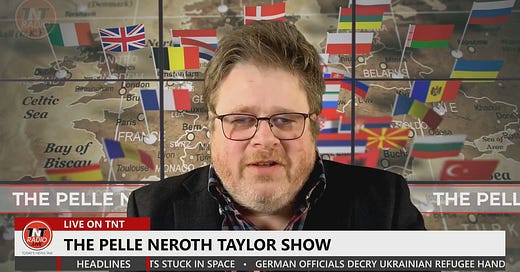I hate the Moor
And it is thought abroad, that 'twixt my sheets
He has done my office: I know not if't be true;
But I, for mere suspicion in that kind, Will do as if for surety.
He holds me well; The better shall my purpose work on him.
Cassio's a proper man: let me see now:
To get his place and to plume up my will In double knavery--How, how? Let's see:—
After some time, to abuse Othello's ear
That he is too familiar with his wife.
He hath a person and a smooth dispose
To be suspected, framed to make women false.
The Moor is of a free and open nature,
That thinks men honest that but seem to be so,
And will as tenderly be led by the nose
As asses are. I have't. It is engender'd. Hell and night
Must bring this monstrous birth to the world's light.
So Iago (in Shakespeare’s Othello) introduces himself as a psychopath—a deceiver and manipulator who feigns friendship in order to destroy a man and his wife.
Iago is surely one of the most mysterious characters in all of literature. What exactly motivates him? He mentions a rumor abroad that Othello has slept with his wife, but he doesn’t say it with much conviction. It’s as though he’s offering it as a mere excuse for the mayhem he is planning. Othello’s greatest vulnerability is his trusting nature, which Iago intends to exploit with shocking ruthlessness.
Crime—and our fascination with crime—is as old as the Book of Genesis, in which Cain murders his brother Abel. I recently spoke with TNT radio host Pelle Neroth Taylor about my adventures as a true crime writer, and how they led me to recognize the official pandemic response for the massive organized crime that it was.
Mr. Taylor possesses vast knowledge of British and European affairs for the last fifty years. I had great fun conversing with him about crime, including the global organized crime that we’ve seen for the last four years.



















check out a video by neil oliver at banned.video....we must expose the last pandemic to stop the next
Kinda like how we exposed the presidential coup to make sure that another election wouldn’t be stolen? (It’s at this point that I frankly began wondering if our sovereignty would last to the next .. election. And? Even if we do it seems inevitable that war will ensue due to a media that constantly lies via omission. I believe a bloody civil unrest like never before is on the horizon and I wonder how these political witches are going to mix in the bird flue this time..
One cartel partnering with another. If you're familiar with the Apalachin Meeting (dramatized in The Godfather, Analyze This, etc) there's a lot of reason to believe the National Crime Syndicate has been running our nation and has expanded the very profitable model to be international. Divvying up global regions and industries (pharmaceuticals, defense, agriculture, manufacturing, tech, etc) the same as organized crime gangs have divvied national regions and crime industries (numbers, drugs, prostitution, etc).
https://www.nationalcrimesyndicate.com/apalachin-meeting/
And when you control the media, when you control the police and when you control the justice system you control a city, a state, an entire nation, and you can control the world as the most powerful crime syndicate ever in human history.
Shakespeare is racist, dontcha know? And the Book of Genesis ! Those genocidal, apartheid, white supremacist, Zionist Jewish oppressors! How dare you!
Dr. David Martin reveals everything in this interview:
https://banned.video/watch?id=667329a54e224dd6b27a1afa He believes all pandemics will be stopped if the pharmaceutical companies lose their liability exemption.
Or if we simply refuse. It's already been done by many, so I know refusal is possible. (I prefer plandemic, but holocaust works as well.)
Explosive Study Once Removed by Lancet within 24 Hours, Now Peer-Reviewed and Public: Reveals 74% of Deaths Directly Linked to COVID-19 Shot https://www.thegatewaypundit.com/2024/06/lancet-journal-study-finds-73-9-deaths-following/
Double whammy, that's what I'd like to see: Do not comply and END "the get-out-of-jail-free-card" in place since 1986.
And tell your reps and Senate critters that you will accept nothing less.
Nothing less.
I agree, but my "representative" supports the WHO treaty. I still write, but the only way I see We the People taking our country and lives back is peaceful refusal. Given the current administration's eagerness to jail any and everyone who protests, resistance so far (along with court cases, even though they ignore them) is the way to go. I am looking for the follow on class action now that a court found the jab to be a treatment, not a vaccine. But I believe that has to go through all the court levels before the class action can be viable.
And? People, especially democrats, had been dumbed down both by big pharma and politically by the DoE indoctrination that Charlotte Iserbyt warned us about in her book The Dumbing Down Of America. In so many ways - people had been primed for this deception which many also believed set us up for the 2020 coup that put a total plaegerist puppet and total idiot in the Presidency. So. In basically in the space of 40-50 years the United Stated had gone from being the international savior of freedom to perpetuating freedom of conscience being morphed into the freedom from owning a conscience being evil personified and totally untrustworthy. To the place where it was more than apparent that they were purposefully disconnecting us from even being sovereign. The United States went from being at the top both spiritually and scholastically to leading the free world back into a “jungle” where tattoos and nose rings became the norm! And we even went one further than the natives. We started carving each other up in the name gender diversity and totally rejected biological science out of hand. Interesting how this rejection of science coincided with another scientific anomaly that ended up taking 17 million lives worldwide with the death rate in the United States being one of the highest..
The coup wouldn't have been possible when the "mark" himself is so easily duped + went along with Fauci/Birx's schemes. All parts of the puzzle moved in unison, with action/reaction so perfectly in sync to leave the people ever further from an illusion of access to political voice/power.
The nose rings really define one as an abject fool. Tats seemed innocuous enough when they were used to identify as military or a biker. Now that so many have them they just look ugly and ridiculous.
agreed. I have such a hard time taking anyone serious who has piercings. And tats? Its like bumper stickers all over a Ferrari in my estimation.
Indeed, very concerning. It appears we have treasonous politicians leading Western civilization, steering us toward a disastrous population clash.
Seems?
You're too kind.
Clash?
Again, your choice of words effectively foretell the unwanted epic we're being thrust into.
Glad you liked!
God asked Cain where his brother is. Cain said I can't tell you, I'm not Abel.
Here’s a thought.
The personal drones are here now, being manufactured by the million, some as small as a nickel. They are currently under the control of the current administration being used on perceived enemy’s, soldier or civilian. They carry explosives to disappear any target. They are inescapable, tracking and following victims to their demise. “They” have already scanned your face, and family. Better be a good little comrade. Keep your mouth shut or vote Democrat banner, coward, and you’ll be fine.
Yet another reason for any dissenter to open carry and perhaps practice shooting clay pigeons.
Enjoyed this interview, thanks John!
In Sept 2022, I had the opportunity to hear Dr. McCullough speak in person at a church in Meridian, ID. There I purchased a signed copy of “The Courage to Face COVID-19.” A fantastic read of the mass killing underway by several serial murderers; Fauci being one of those evil creatures at the top of the list. Thank you, John, for your collaboration with Dr. McCullough. 🙏🏻
I think most people feel sorry for those whose "trusting nature" causes them grief, like Othello. No sympathy from me. The "trusting nature" of our fellows is what psychopaths and other evil players count on. It's the greatest source of their power, and ends up hurting the rest of us who know better. What better example than the masses jumping on board with the insanity of the COVID response? We won't recover in our lifetimes, if ever.